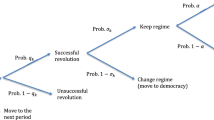Abstract
African politics long revolved around ‘personal rulers’ who either overstayed in office or were quickly ousted by coups. The multiparty reforms of the 1990s were meant to change and regularise the way in which African rulers access and are removed from office. There is, however, a dearth of systematic data through which the evolution and implications of leadership transitions can be examined. We thus built a comprehensive Africa Leadership Change (ALC) dataset covering all 54 countries in the continent from 1960 to 2015. The dataset provides information for all leaders who held power in the region, the modes of access to leadership and several other key election and regime variables. An exploratory analysis illustrates how Africa’s reforms affected the dynamics and timing of leaders’ replacement, as well as their socio-economic implications. A comparison with existing datasets shows that ALC is more suitable for investigating leadership transitions in Africa.


Source: ALC dataset.

Source: ALC dataset.

Source: ALC dataset.

Source: ALC dataset; World Development Indicators.

Source: ALC dataset; World Development Indicators.
Similar content being viewed by others
References
Ahlquist, J. and Levi, M. (2011) ‘Leadership: what it means, what it does, and what we want to know about it’, Annual Review of Political Science 14: 1–24.
Bach, D. (2012) ‘Patrimonialism and neopatrimonialism: Comparative receptions and transcriptions’, in D. Bach and M. Gazibo (eds.) Neopatrimonialism in Africa and Beyond, London: Routledge, pp. 25–45.
Bates, R.H. (2008) When Things Fell Apart. State Failure in Late-Century Africa, Cambridge: Cambridge University Press.
Bayart, J.F. (1993) The State in Africa. The Politics of the Belly, London: Longman.
Bell, D.S. (2014) ‘Political leadership’, Government & Opposition 49(1): 139–158.
Blondel, J. (1987) Political Leadership. Towards a General Analysis, London: SAGE.
Bratton, M. and van de Walle, N. (1994) ‘Neo-patrimonial regimes and political transitions in Africa’, World Politics 46: 453–489.
Bratton, M. and van de Walle, N. (1997) Democratic Experiments in Africa. Regime Transitions in Comparative Perspective, Cambridge: Cambridge University Press.
Carbone, G. and Pellegata, A. (2017) ‘To elect or not to elect. Leaders, alternation in power and social welfare in sub-Saharan Africa’, The Journal of Development Studies. doi:10.1080/00220388.2017.1279733.
Carothers, T. (2002) ‘The end of the transition paradigm’, Journal of Democracy 13(1): 5–21.
Cassani, A. (2014) ‘Hybrid what? Partial consensus and persistent divergences in the analysis of hybrid regimes’, International Political Science Review 35(5): 542–558.
Cheibub, J.A., Gandhi, J. and Vreeland, J.R. (2010) ‘Democracy and dictatorship revisited’, Public Choice 143(1–2): 67–101.
Cheeseman, N. (2010) ‘African elections as vehicles for change’, Journal of Democracy 21(4): 139–53.
Diamond, L. (2002) ‘Thinking about hybrid regimes’, Journal of Democracy 13(2): 21–35.
Geddes, B., Wright, J. and Frantz, E. (2014) ‘Autocratic breakdown and regime transitions: A new data set’, Perspectives on Politics 12(2): 313–331.
Gleditsch, N.P., Wallensteen, P., Eriksson, M., Sollenberg, M. and Strand, H. (2002) ‘Armed conflict 1946–2001: A new dataset’, Journal of Peace Research 39(5): 615–637.
Goemans, H., Gleditsch, K. and Chiozza, G. (2009) ‘Introducing Archigos: A dataset of political leaders’, Journal of Peace Research 46(2): 269–283.
Goldsmith, A.A. (2001) ‘Risk, rule and reason. Leadership in Africa’, Public Administration and Development 21(1): 77–87.
Goldsmith, A.A. (2004) ‘Predatory versus developmental rule in Africa’, Democratization 11(3): 98–110.
Horowitz, S., Hoff, K. and Milanovic, B. (2009) ‘Government turnover: Concepts, measures and applications’, European Journal of Political Research 48(1): 107–129.
Jackson, R.H. and Rosberg, C.G. (1982) Personal Rule in Black Africa. Prince, Autocrat, Prophet, Tyrant, Berkeley: University of California Press.
Joseph, R.A. (1984), ‘Class, state and prebendal politics in Nigeria’, Journal of Commonwealth and Comparative Politics 21(3): 21-38.
Hyde, S.D. and Marinov, N. (2012) ‘Which elections can be lost?’, Political Analysis 20(2): 191–201.
Levitsky, S. and Way, L. (2010) Competitive Authoritarianism: Hybrid Regimes After the Cold War, Cambridge: Cambridge University Press.
Lindberg, S. (2006) Elections and Democracy in Africa, Baltimore: Johns Hopkins University Press.
Lindberg, S. (ed.) (2009) Democratization by Elections: A New Mode of Transition, Baltimore: Johns Hopkins University Press.
Lyne de Ver, H. (2008) ‘Leadership, politics and development: A literature survey’, Background paper 03, Development Leadership Program.
McGowan, P. (2003) ‘African military coups d’état, 1956–2001: Frequency, trends and distribution’, Journal of Modern African Studies 41: 339–370.
Marshall, M. and Cole, B. (2011) Global Report 2011. Conflict, Governance, and State Fragility, Vienna: Center for Systemic Peace.
Mazrui, A. (1967) ‘The monarchical tendency in African political culture’, British Journal of Sociology 18: 231–250.
Mazrui, A. (1970) ‘Leadership in Africa: Obote of Uganda’, International Journal 25(3): 538–564.
Nohlen, D., Krennerich, M. and Thibaut, B. (eds.) (1999) Elections in Africa. A Data Handbook, Oxford: Oxford University Press.
Posner, D. and Young, D. (2007) ‘The institutionalization of political power in Africa’, Journal of Democracy 18(3): 126–140.
Rhodes, R.A.W. and ‘t Hart, P. (2014) ‘Puzzles of political leadership’, in R. A.W. Rhodes and Paul ‘t hart (eds.) The Oxford Handbook of Political Leadership, Oxford: Oxford University Press, pp. 1–21.
Schedler, A. (2006) Electoral Authoritarianism: The Dynamics of Unfree Competition, Boulder: Lynne Rienner.
Teorell, J., Dahlberg, S., Holmberg, S., Rothstein, B., Hartmann, F. and Svensson, R. (2015) The Quality of Government Standard Dataset, Version Jan15. University of Gothenburg: The Quality of Government Institute, http://www.qog.pol.gu.se.
van de Walle, N. (2002) ‘Africa’s range of regimes’, Journal of Democracy 13(2): 66–80.
Acknowledgements
This work is part of a research project on The Economic, Social and Political Consequences of Democratic Reforms: A Quantitative and Qualitative Comparative Analysis (COD), funded by a Starting Grant of the European Research Council (Grant Agreement No. 262873, ‘Ideas’, 7th Framework Programme of the EU).
Author information
Authors and Affiliations
Corresponding author
APPENDIX
APPENDIX
Rights and permissions
About this article
Cite this article
carbone, g., pellegata, a. researching the dynamics of leaders’ replacement: the Africa Leadership Change (ALC) dataset. Eur Polit Sci 17, 187–210 (2018). https://doi.org/10.1057/s41304-016-0099-y
Published:
Issue Date:
DOI: https://doi.org/10.1057/s41304-016-0099-y




